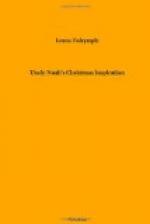I
The twilight of a Christmas Eve, gray with the portent of coming snow, crept slowly over the old plantation of Brierwood, softening the outlines of a decrepit house still rearing its roof in massive dignity and a tumbledown barn flanked by barren fields. A quiet melancholy hovered about the old house as if it brooded over a host of bygone Yuletides alive with the shouts of merry negroes and the jingle of visiting sleighs—Yuletides when the snowy dusk had been ushered in to the lowing of cattle and the neighing of horses safely housed in the old barn. There were no negroes now, no blooded stock—no fluttering fowls save one belligerent old turkey gobbler fleeing from a white-haired darky who tried in vain to drive him to his roost in the barn.
In the library of the old house a man, tall and eagle-eyed, peered out beneath bushy white eyebrows at the fading landscape blurred by the dancing forms of the negro and the recalcitrant turkey. He watched the chase end with an impertinent gobble from the turkey, and, at the sound of a closing door in the rear of the house, tapped a bell at his side. Footsteps shuffled along the hallway, and, breathless from his chase, the old negro entered.
Colonel Fairfax wheeled with military precision. “Uncle Noah,” he said sternly, “to-morrow will be Christmas.”
The darky nodded and hobbled hurriedly to the wood fire, bending over as he poked it to hide the look of anxiety in his face. “Laws-a-massy, Massa Fairfax,” he grumbled in good-natured evasion, “yoh’d mos’ freeze to deaf, I reckons, ‘thout sendin’ foh me”—he coughed, and amended hastily: “‘thout sendin’ foh one ob de servants to pile up dis yere fire.”
The amendment was but one of Uncle Noah’s many subterfuges to convince himself and his master that there had been no changes in the Fairfax fortunes since the old days. That he was the last of the Colonel’s retainers, a wageless, loyal old dependent attending to the manifold tasks of a sole domestic, the negro never admitted even to himself. That his quaint pretensions, however, were daily stimulants to the fierce old Colonel hungrily eating his heart out with memories Uncle Noah was well aware. So the pitiful little subterfuges, revealing the subtle understanding of the two, peopled the old house with swarming negroes and the horn of plenty to the joy of both.
But to-day Uncle Noah felt uneasily that the reference to the servants had not bolstered the Colonel as it usually did, and the old darky groaned inwardly as he added wood to the fire. From the corner of his eye he saw that the Colonel had drawn himself up to military rigidity, an evidence that the old soldier was on his mettle and would brook no opposition.
“Uncle Noah,” he said, fixing a stern eye on the old man, “in the Fairfax family there has always been a turkey at Christmas.”
There was no suggestion in the darky’s affable tones of the erratic manner in which his heart was beating. “Yes, sah,” he agreed, “ofttimes mo’ than one.”




